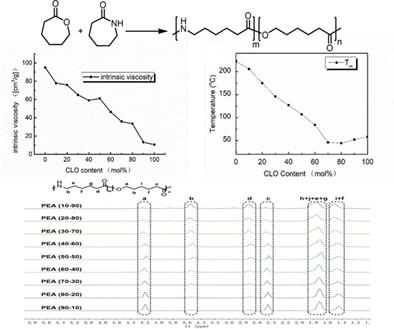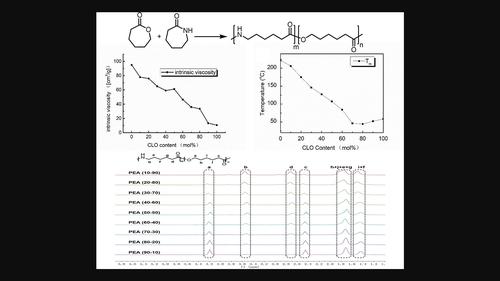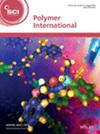Yihuan Liu, Guoqing Zuo, Han Gao, Zhao Wu, Wei Huang, Canliang Ma, Jie Yin, Xin Hu, Ning Zhu, Kai Guo
求助PDF
{"title":"调节酯含量,实现聚酯酰胺的可调热性能和机械性能","authors":"Yihuan Liu, Guoqing Zuo, Han Gao, Zhao Wu, Wei Huang, Canliang Ma, Jie Yin, Xin Hu, Ning Zhu, Kai Guo","doi":"10.1002/pi.6585","DOIUrl":null,"url":null,"abstract":"<p>Poly(<i>ε</i>-caprolactone-<i>co</i>-<i>ε</i>-caprolactam) was synthesized through ring-opening copolymerization of <i>ε</i>-caprolactone (CLO) and <i>ε</i>-caprolactam catalyzed by ethylmagnesium bromide (EtMgBr) or sodium <i>ε</i>-caprolactam. Varied ester contents were achieved from 0 to 100 mol%. EtMgBr enabled the copolymerization with high yield of over 95%. Thermal properties vary with different ester contents. With increasing CLO content, the onset decomposition temperature (273.36 to 240.97 °C) and glass transition temperature (52.1 to −56.3 °C) gradually decreased. The results of melting behavior of resultant poly(ester amide)s through differential scanning calorimetry and theoretical calculation indicated a eutectic temperature of 46.6 °C. The mechanical properties of obtained copolymers were systematically investigated. The enhancement of CLO incorporation led to a decrease in tensile strength (70.99 to 9.88 MPa) and Young's modulus (690.03 to 19.18 MPa). Copolymer with CLO incorporation of 70 mol% exhibited a eutectic temperature of 46.6 °C, and enabled a high elongation at break (658%) and enhanced impact strength (138.5 kJ m<sup>−2</sup>). © 2023 Society of Chemical Industry.</p>","PeriodicalId":20404,"journal":{"name":"Polymer International","volume":"73 3","pages":"223-229"},"PeriodicalIF":2.9000,"publicationDate":"2023-10-26","publicationTypes":"Journal Article","fieldsOfStudy":null,"isOpenAccess":false,"openAccessPdf":"","citationCount":"0","resultStr":"{\"title\":\"Regulation of ester contents enabled tunable thermal and mechanical properties of poly(ester amide)\",\"authors\":\"Yihuan Liu, Guoqing Zuo, Han Gao, Zhao Wu, Wei Huang, Canliang Ma, Jie Yin, Xin Hu, Ning Zhu, Kai Guo\",\"doi\":\"10.1002/pi.6585\",\"DOIUrl\":null,\"url\":null,\"abstract\":\"<p>Poly(<i>ε</i>-caprolactone-<i>co</i>-<i>ε</i>-caprolactam) was synthesized through ring-opening copolymerization of <i>ε</i>-caprolactone (CLO) and <i>ε</i>-caprolactam catalyzed by ethylmagnesium bromide (EtMgBr) or sodium <i>ε</i>-caprolactam. Varied ester contents were achieved from 0 to 100 mol%. EtMgBr enabled the copolymerization with high yield of over 95%. Thermal properties vary with different ester contents. With increasing CLO content, the onset decomposition temperature (273.36 to 240.97 °C) and glass transition temperature (52.1 to −56.3 °C) gradually decreased. The results of melting behavior of resultant poly(ester amide)s through differential scanning calorimetry and theoretical calculation indicated a eutectic temperature of 46.6 °C. The mechanical properties of obtained copolymers were systematically investigated. The enhancement of CLO incorporation led to a decrease in tensile strength (70.99 to 9.88 MPa) and Young's modulus (690.03 to 19.18 MPa). Copolymer with CLO incorporation of 70 mol% exhibited a eutectic temperature of 46.6 °C, and enabled a high elongation at break (658%) and enhanced impact strength (138.5 kJ m<sup>−2</sup>). © 2023 Society of Chemical Industry.</p>\",\"PeriodicalId\":20404,\"journal\":{\"name\":\"Polymer International\",\"volume\":\"73 3\",\"pages\":\"223-229\"},\"PeriodicalIF\":2.9000,\"publicationDate\":\"2023-10-26\",\"publicationTypes\":\"Journal Article\",\"fieldsOfStudy\":null,\"isOpenAccess\":false,\"openAccessPdf\":\"\",\"citationCount\":\"0\",\"resultStr\":null,\"platform\":\"Semanticscholar\",\"paperid\":null,\"PeriodicalName\":\"Polymer International\",\"FirstCategoryId\":\"92\",\"ListUrlMain\":\"https://onlinelibrary.wiley.com/doi/10.1002/pi.6585\",\"RegionNum\":4,\"RegionCategory\":\"化学\",\"ArticlePicture\":[],\"TitleCN\":null,\"AbstractTextCN\":null,\"PMCID\":null,\"EPubDate\":\"\",\"PubModel\":\"\",\"JCR\":\"Q2\",\"JCRName\":\"POLYMER SCIENCE\",\"Score\":null,\"Total\":0}","platform":"Semanticscholar","paperid":null,"PeriodicalName":"Polymer International","FirstCategoryId":"92","ListUrlMain":"https://onlinelibrary.wiley.com/doi/10.1002/pi.6585","RegionNum":4,"RegionCategory":"化学","ArticlePicture":[],"TitleCN":null,"AbstractTextCN":null,"PMCID":null,"EPubDate":"","PubModel":"","JCR":"Q2","JCRName":"POLYMER SCIENCE","Score":null,"Total":0}
引用次数: 0
引用
批量引用



 求助内容:
求助内容: 应助结果提醒方式:
应助结果提醒方式:


